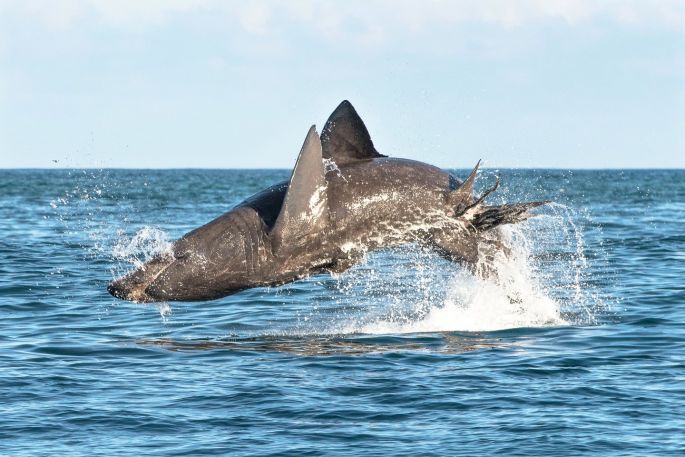Basking sharks jump as high and as fast as a great white
- Wednesday, September 12, 2018
A team of scientists, including Dr Lewis Halsey and Dr Nicholas Payne from the University of Roehampton, has discovered that basking sharks can jump as fast and as high out of the water as their cousin, the famously powerful and predatory great white shark.

Hundreds of basking sharks live off the shores of Cornwall, Ireland and Scotland, and are second largest fish in the world, reaching lengths up to 10m (33ft). They have a reputation for being slow and languid as they scour the sea for their staple diet of plankton.
The research from our Department of Life Sciences used video analysis of both species to estimate vertical swimming speeds at the moment the sharks leave the water. Furthermore, one particularly large basking shark was fitted with a video and data recording device to measure its speed and movement for many hours.
At one point during deployment of the recording device, in just over nine seconds and ten tail beats, the basking shark accelerated from a depth of 28m to the surface, breaking through the water at nearly 90 degrees. The shark cleared the water for one second and peaked at a height of 1.2m above the surface.
To achieve this breach, the basking shark exhibited a six-fold increase in tail beat frequency and attained a top speed of approx. 5.1m/s. This is more than twice as fast as the average competitor in the Olympic men's 50m freestyle swim. The videos the researchers took from boats and the land of both basking sharks and great whites breaching showed similar speeds of breaching in other individuals.
Dr Lewis Halsey said: “The results of this research put the basking shark in a new athletic light. While there are no recorded incidents of them being of danger to swimmers or small boats (unlike the great white shark), we now know they do have an impressive ability to swim at great speeds and jump clear of the water. Why they do it, we still don't know. Communicating, mating behaviour or parasite removal are three possibilities.”
The research team comprised Queen's University Belfast, University of Roehampton, Trinity College Dublin, University of Cape Town, Irish Basking Shark Study Group and the South African Institute for Aquatic Biodiversity.
Staff in the Department of Life Sciences undertake world-class research which changes lives and furthers our understanding of science. It offers an undergraduate course in Zoology, alongside a range of other undergraduate and postgraduate degrees.